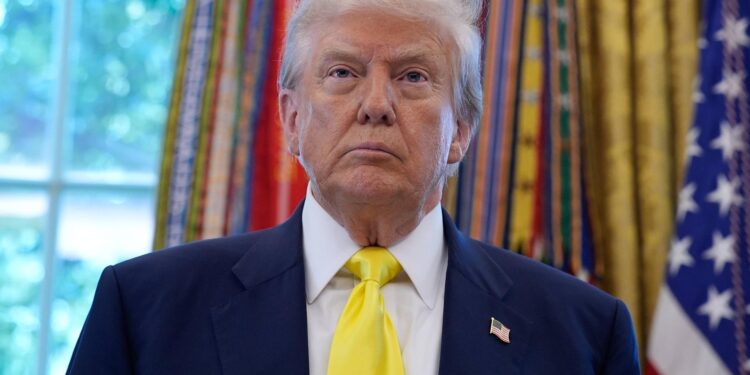In a surprising move that has caught international observers off guard, the Trump administration has imposed tariffs on Moldovan goods, igniting questions about the rationale behind targeting one of Eastern Europe’s smallest economies. This opinion piece delves into the geopolitical and economic implications of Washington’s decision, exploring why Moldova-an unlikely contender in the broader US trade agenda-has found itself at the center of a contentious tariff dispute.
Trump’s Tariffs on Moldova Raise Questions About Strategic Intentions
In a surprising move that has left experts scrambling for clarity, the imposition of tariffs on Moldova by the Trump administration signals a complex interplay of economic pressure and geopolitical signaling. Despite Moldova’s limited impact on U.S. trade volumes, the tariffs suggest that economic measures are being wielded not just for trade leverage but potentially as a strategic message amidst shifting alliances in Eastern Europe. Observers note that this bold stance could be intended to realign Moldova’s foreign relations, particularly as it flirts with deeper ties to the European Union and NATO.
Market analysts point out several immediate consequences of this decision:
- Disrupted Export Channels: Moldovan wine and agricultural exports are now facing significant barriers, threatening a vital source of income.
- Political Uncertainty: The tariffs may fuel domestic unrest and complicate Moldova’s reform agenda.
- Message to Regional Players: This action sends a clear signal to neighboring countries about the costs of shifting allegiances.
| Sector | Impact | Potential Response |
|---|---|---|
| Wine Exports | 30% decline expected | Seeking alternative markets |
| Agriculture | Reduced demand in U.S. | Increased focus on EU trade |
| Political Relations | Strained US-Moldova ties | Engagement with multilateral bodies |
Economic Impact of Tariffs on Moldova’s Trade and Growth Prospects
Recent tariffs imposed have sent ripples through Moldova’s fragile economy, casting a shadow over its trade relations and future growth trajectory. As a small, open economy heavily reliant on export markets, the increased costs associated with these duties threaten to erode Moldova’s competitive edge, particularly in agricultural and textile sectors where margins are already thin. Experts warn that the direct consequence could be a reduction in export volumes to key markets, triggering a slowdown in manufacturing output and job losses in export-dependent regions.
The economic strain is multifaceted, affecting not only the trade balance but also investment confidence and currency stability. Key repercussions include:
- Declining export revenues leading to budgetary constraints for public spending.
- Increased production costs as import-dependent inputs face higher tariffs.
- Risk of trade diversion that could destabilize existing supply chains.
| Sector | Estimated Impact | Potential Job Losses |
|---|---|---|
| Agriculture | -7% export decline | 5,000 |
| Textiles | -10% export decline | 3,200 |
| Machinery | ||
| Machinery | -5% export decline | 1,500 |
Summary of Impact:
- Agriculture faces a 7% decline in exports resulting in about 5,000 potential job losses.
- Textiles may see a sharper 10% export decline with roughly 3,200 jobs at risk.
- Machinery has a relatively smaller impact with a 5% drop and 1,500 jobs potentially affected.
These impacts combine to highlight significant challenges for Moldova’s export sectors due to the tariffs, potentially affecting economic growth and employment in export-oriented industries.
If you want, I can help you generate a full report, provide policy recommendations, or analyze possible mitigation strategies. Just let me know!
Policy Recommendations for Addressing US-Moldova Trade Tensions
To ease the mounting trade tensions between the US and Moldova, policymakers should prioritize targeted diplomatic engagement that addresses specific economic concerns while reinforcing bilateral cooperation. Initiatives such as setting up a bilateral trade commission could pave the way for transparent discussions on tariff policies and trade barriers. This platform would allow stakeholders from both sides to directly communicate grievances, clarify misunderstandings, and collaboratively create mutually beneficial trade frameworks. Additionally, providing technical assistance to Moldovan exporters can help align their standards with US requirements, ensuring that tariff disputes do not stem from avoidable non-compliance issues.
In tandem with diplomatic efforts, the United States should consider implementing measured trade adjustments instead of broad tariffs that indiscriminately impact Moldova’s vulnerable sectors. Policymakers might explore:
- Gradual tariff phase-outs tied to demonstrable progress in trade practices
- Special economic zones or incentives encouraging US-Moldovan joint ventures
- Improved customs cooperation to prevent illegal trade while facilitating legitimate commerce
Such calibrated approaches can reduce the backlash on Moldova’s economy while signaling Washington’s commitment to constructive partnership rather than punitive measures.
| Policy Action | Expected Outcome |
|---|---|
| Establishment of US-Moldova Trade Commission | Improved dialogue and dispute resolution |
| Tariff Gradual Phase-out | Reduced economic strain on Moldovan exporters |
| Technical Assistance Programs | Higher compliance with US import standards |
| Joint Economic Incentives | Strengthened bilateral investment and jobs |
Future Outlook
As the complexities of international trade continue to unfold, the imposition of tariffs on Moldova raises critical questions about the broader strategic intentions behind such economic measures. While official explanations remain sparse, the impact on Moldova’s economy and its diplomatic relations cannot be overlooked. Observers will be watching closely to see how both Washington and Chisinau navigate this unexpected development, and what it could signal for future U.S. trade policy in Eastern Europe.
















